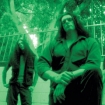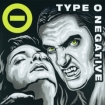Revolver has teamed with Type O Negative for a limited-edition "clear w/ black swirl" vinyl variant of their 1991 debut album Slow, Deep and Hard. Order yours now before they're gone!
"There are two kinds of bands: Bands that happen by accident and bands that lie and tell you it wasn't an accident." That's what Type O Negative keyboardist and producer Josh Silver told me when I interviewed him for the liner notes of the 2009 remaster of the band's 1991 debut, Slow, Deep and Hard. Noisy and angry, the album is a far cry from the hooky choruses and doom-out goth of their 1993 breakout, Bloody Kisses. But it established the tongue-in-cheek attitude they kept through their entire career.
Lyrically, Slow, Deep and Hard has more in common with the politically incorrect sarcasm of frontman Peter Steele's previous band, NYC hardcore bruisers Carnivore, than it does with subsequent Type O releases. Songs like "Unsuccessfully Coping With the Natural Beauty of Infidelity," "Prelude to Agony" and especially "Der Untermensch" caused rampant and unfounded accusations of misogyny, bigotry and straight-up Nazism — mostly from people who couldn't (or refused to) grasp sarcasm. "We never planned on creating controversy to attain anything," Silver said. "It just kinda happened — and it wasn't fun. We were grilled by the press. People who showed up to do interviews were really hostile."
But with the right set of ears, an open-minded listener will recognize the songs on Slow, Deep and Hard for what they are: hilarious. "I think Peter was at the height of his lyrical powers," Silver said. "It's something you couldn't do twice because you didn't even know you were doing it while you were doing it. And that's something that's irreplaceable."
With that in mind, here are ten things you probably didn't know about Slow, Deep and Hard.
1. Josh Silver's parents funded the recording of Slow, Deep and Hard.
Recorded at Systems Two in Brooklyn — the same studio Type O would record all their future albums in (albeit in a different location) — Slow, Deep and Hard cost $6,000 to make. Somehow, Silver convinced his parents to lend him the cash. "I'm not even sure I paid them back," he revealed in the 2009 liner notes. "They probably thought they were getting off cheap, though. It's like, 'We thought we'd have to pay for college, but you're too stupid to have done that.'"
2. The album was originally released under a different band name.
When the band recorded the songs, they weren't yet using the name Type O Negative. They were calling themselves Repulsion — until they found out about the one-and-done grindcore progenitors from Flint, Michigan, who had released Horrified in 1989. By then, Steele and company had already released their material — minus the track "Glass Walls of Limbo" — as a cassette demo entitled None More Negative before signing with Roadrunner and changing their name.
3. The photo used for Slow, Deep and Hard's cover was stolen from a porno mag.
The image on the cover of Slow, Deep and Hard is a close-up of sexual penetration nicked from a porno mag. The band resized and photocopied the graphic shot to get the proper grain. "It's not an original photograph," Silver conceded. "I wish it was mine, because the guy has a pretty big cock. But I'm kind of ashamed of taking it now — it's kind of like [illegal] downloading. But we didn't know better at the time. And it probably would've been easy to get the rights to use it, actually." Type O learned their lesson, apparently. For the cover of 1992's The Origin of the Feces, they used an original photograph of Steele's hairy anus.

4. The graphic lyrics of "Unsuccessfully Coping With the Natural Beauty of Infidelity" turned heads — and caused problems.
Opening your debut album with a nearly 13-minute track probably isn't the best idea, but Type O always liked bad ideas. The song itself is a hilariously graphic kiss-off to an ex-girlfriend who Steele caught with another dude at the now-defunct Brooklyn metal club, L'Amour. The lyrics, though? "You had cock on your mind and cum on your breath/Inserted that diaphragm before you left/Practicing freelance gynecology/Where there's a womb there's a way/With you it's free/Slut! Whore! Cunt!"
Steele then lifted the chord progression from Simple Minds' 1985 Breakfast Club classic, "Don't You (Forget About Me)" before launching into the immortal chorus: "I know you're fucking someone else." Feminist groups were not amused. Type O guitarist Kenny Hickey attempted to explain the band's intent in the 2009 liner notes: "We were talking about being angry at a woman for cheating on you. We weren't calling all women sluts."
5. "Der Untermensch" elicited outrage — and inspired accusations that the band "were Nazis."
The title of the album's second track essentially means "subhuman." Literally translated from German, it means "under man," a one-size-fits-all slur used by the Nazis to describe pretty much anyone who wasn't a goose-stepping Aryan. But, of course, very few people grasped that Type O were dealing in satire: Silver, for one, is Jewish. "That song started a ton of trouble," he recalled. "They just invented a bunch of shit and said we were Nazis. Meanwhile, there were bands playing right down the block that are sieg-heiling the audience, and nobody's bothering with them. But it was a good and bad thing. As a Jew, I obviously never wanna be labeled as a Nazi. But at the same time, go ahead and make us famous. That's fine."
6. Type O's European tour for Slow, Deep and Hard was a disaster.
Due to the controversy surrounding "Der Untermensch," Type O's first European tour did not go well. "The Germans were canceling shows up and down the line," Hickey recalled. "They were breaking windows on the bus, there were threats of riots and we couldn't walk the streets." Holland banned Type O outright. "Not for our views, but because they feared for public safety," Silver explained. "It got real of out of hand. I think we did about three shows and the rest got canceled. Peter was so pissed off he flew home. The rest of us stayed, because that's just the kind of assholes we are."
"You can't do sarcasm in Europe," he added. "They're translating lyrics literally. They don't get the twist, the spoof."
7. The band received flak — and one "freaky" death threat — because of "Prelude to Agony."
The album's fourth track is a heaving 12-minute power dirge that kicks off with a riff straight out of Sabbath's "Hole in the Sky" and ends with the sound of a jackhammer and a woman screaming. The band jokingly referred to this sequence as "Jackhammerape," but not everyone was laughing. "I remember we got a letter about that one," Silver recalled. "You know how murderers type those letters using all different typefaces? It was one of those, and it said something like, 'Rape is not funny or fashionable. Fuck you. Die.' I gotta say, it was really freaky."
"The song is about betrayal," Silver explained. "A lot of Slow, Deep and Hard is about betrayal — feeling betrayed by relationships and being fucked over by women. I mean, that's what most young men are concerned with, and so were we. It seemed to be a running theme through most of the album, and that was the imaginary revenge portion. But we're not promoting rape. We're promoting anger. If you don't like it, don't listen to us."
8. Slow, Deep and Hard's one minute of silence is not actually silence.
To the untrained ear, the one-minute interlude "The Misinterpretation of Silence and Its Disastrous Consequences" sounds like one minute of total silence. But in true Type O fashion, it's not. "It's tape hiss," Silver revealed. "If you turn it up really loud, you'll hear it. We actually just ran a blank tape. We were hoping people would think it was fucked up and turn their stereos up really loud. Then the next song would kick in …"
9. "Glass Walls of Limbo (Dance Mix)" is way more (and less) complicated than it sounds.
The album's ironically titled fifth track basically sounds like six minutes and 44 seconds of chanting and noise. But it wasn't just thrown together. "The song probably had 36 tracks of vocals alone," Silver explained. "There were three parts, and they all had 12 tracks apiece. There was no Pro Tools back then, no pitch correction. Peter had to do 'em til he got it right." As for the noise? "That was just us whacking chains against the studio floor."
10. The Munsters theme song inspired the main riff in "Gravitational Constant."
In a November 2019 interview with Loudwire, Hickey revealed that the main riff from album closer "Gravitational Constant: G = 6.67 x 10-8 Cm – 3 Gm – 1 Sec-2" was inspired by the theme song from the beloved 1960s sitcom The Munsters. Of course, Type O would revisit The Munsters on their 1993 breakout album Bloody Kisses, when Steele namechecked Lily Munster in the lyrics to "Black No. 1."












